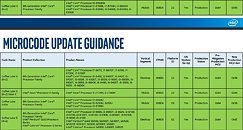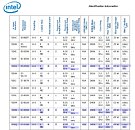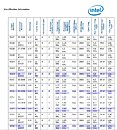Tuesday, July 3rd 2018

Intel 9000 Series CPU Lineup Confirmed in Official Microcode Revision Guidance + Clocks
Following all of the unofficial, tentative tidbits of information following Intel's on-again, off-again 9000 series CPU lineup (which still belongs to the 8th Generation), we now have official confirmation - as is usual, through Intel's documentation. In this instance, the "culprit" is Intel's Microcode Revision Guidance. The Coffee Lake S series featuring 6+2 configurations are now listed with Core i5-9600(K), Core i5-9500(T) and the Core i5-9400, while the Core i3-9100 and Core i3-9000 SKUs are listed with a 4+2 configuration.
Update: Intel's 8th Gen Specification Update now lists clocks and core count for the aforementioned CPUs. Overall, there's an increased 100 or 200 MHz Max Turbo frequency across the board within the same TDP package, and some instances of 100 MHz base frequency increases over Intel's 8000 series CPUs (can't just call them 8th gen anymore now can we?). The 9600K, for example, increases base clocks from the 8600K by 100 MHz (up to 3.7 GHz base), but pole-vaults its predecessor in maximum Turbo (up to 4.5 GHz).Intel's strategy for its top-tier i7 remains somewhat of a mystery: on one hand, Intel could very well keep their 8000 series' tiering scheme, with i7 models featuring 6 cores but 12 threads via Hyper Threading, thus differentiating from the 6-core, 6-thread i5's. But recent events have made it more likely that the company is planning on introducing its i9 tier to the mainstream desktop market. For now, an 8-core, 16-thread CPU (Intel Core i9-9900K); a 6-core, 12-thread one (Intel Core i7-9700K) and a six-core, six-thread part (Intel Core i5-9600K) fall in pretty nicely with Intel's Microcode Update Guidance and 8th gen specification updates.
Sources:
Intel Microcode Revision Guidance, via VideoCardz, Intel Specification Update - June
Update: Intel's 8th Gen Specification Update now lists clocks and core count for the aforementioned CPUs. Overall, there's an increased 100 or 200 MHz Max Turbo frequency across the board within the same TDP package, and some instances of 100 MHz base frequency increases over Intel's 8000 series CPUs (can't just call them 8th gen anymore now can we?). The 9600K, for example, increases base clocks from the 8600K by 100 MHz (up to 3.7 GHz base), but pole-vaults its predecessor in maximum Turbo (up to 4.5 GHz).Intel's strategy for its top-tier i7 remains somewhat of a mystery: on one hand, Intel could very well keep their 8000 series' tiering scheme, with i7 models featuring 6 cores but 12 threads via Hyper Threading, thus differentiating from the 6-core, 6-thread i5's. But recent events have made it more likely that the company is planning on introducing its i9 tier to the mainstream desktop market. For now, an 8-core, 16-thread CPU (Intel Core i9-9900K); a 6-core, 12-thread one (Intel Core i7-9700K) and a six-core, six-thread part (Intel Core i5-9600K) fall in pretty nicely with Intel's Microcode Update Guidance and 8th gen specification updates.



43 Comments on Intel 9000 Series CPU Lineup Confirmed in Official Microcode Revision Guidance + Clocks
Only in 2019, with 10nm from Intel and 7nm from TSMC, we can and should expect significant improvements, from Intel and AMD!
Until then, it's just light tuning and more clocks, just like AMD did in Zen+.
Same core counts, 200MHz more frequency, and the FOURTH iteration of the same architecture (So no IPC improvement) means "RIP AMD"?
I really hope I'm just missing some sarcasm, because this honestly might be Intel's weakest refresh ever. It's certainly the least compelling to me.
EDIT: I originally wrote 2020 for the 3x00 Ryzen chips this is wrong and I meant 2020 so I changed it for future readers.. As this is when these will be released 2020 would be the 4x00 Ryzen Zen 3 chips.
But for fun here are a few recent relevant ones that were used as a basis for my educated opinion.
Intel delay timeline-> www.anandtech.com/show/12693/intel-delays-mass-production-of-10-nm-cpus-to-2019
AMD Zen roadmap-> www.anandtech.com/show/12233/amd-tech-day-at-ces-2018-roadmap-revealed-with-ryzen-apus-zen-on-12nm-vega-on-7nm
Honestly what hope does Intel have against the Zen 2 chips with the 9700K/9900K? A very hot 14nm chip based on a slightly optimized 4 year old architecture vs a high performance 7nm chip on a new Architecture. If AMD can pull 4.6-4.7Ghz singlecore boost and a 10 - 15% IPC improvement on average Intel will be in trouble for the rest of 2019.
It's also important to remember that even though Zen have done some good design choices, most of the improvements over Bulldozer was either correcting "design faults" of Bulldozer or "low hanging fruit". To close the gap further, they need to make a much more advanced front-end/prefetcher, which is much more costly both in terms of development time and die size than just adding another ALU. AMD will also have to step up their game in AVX support, which may not me difficult, but will require a lot of die space, and eventual support for AVX-512 might require cache changes.The first half of 2020 is >1.5 years away, a lot can happen by then.
Your scenario of AMD crushing Intel in 2020 relies on a lot of highly speculative assumptions:
- Intel doing nothing for the next >1.5 years, and Intel 10 nm still be as "bad" as today.
- "TSMC 7nm" to be fantastic and for AMD to have all the production capacity they want.
- AMD Zen 3 to match or exceed Intel's IPC, without degrading energy efficiency.
- AMD Zen 3 to be scalable at higher clock speeds.
It will only take one of these to be slightly off for you to be wrong in your estimate.Skylake might be older than Zen, but still outperforms it by a good margin.
Even if "TSMC 7nm" is extremely good and have no major problems, we'll be looking at late Q4 2019 or Q1 2020 before it can match the clock speeds of the current mature node, and even longer to exceed it.
AMD will also need a bit more than 4.7 GHz boost and 10-15% IPC improvement to exceed Skylake.
Both Nehalem and Sandy Bridge was major redesigns over their predecessors, Haswell and Skylake a little less so (except for X/SP models).
If we compare this to my GCN analog;
Pitcairn -> Hawaii -> Fiji -> Polaris -> Vega
Kepler -> Maxwell -> Pascal -> Volta
There is a huge difference in how these companies evolve their products. GCN did initially close most of the gap with Nvidia, but has fallen further and further behind in every iteration since then. AMD must be careful not to do the same mistake in the CPU market. Tweaking Zen for a couple of years is fine, but then it's time to move on, or they will fall further behind again.
It's kind of strange how many people keep claiming that Intel's innovation have stagnated, while praising AMD who plan to recycle Zen for nearly a decade.:confused:
Skylake does not outperform Zen by a good margin at least not as much as most think it does. Most assumptions that Intel is beating AMD by a good margin are due to Intel chips having a ~25% clockspeed headroom over AMD's first gen Ryzen chips (4Ghz vs 5Ghz), but IPC wise they are very close to each-other. If AMD hits 4.7Ghz clockspeed Intel would only have a 6-10% clockspeed advantage when overclocked and the IPC would be behind AMD so that wouldn't be much of an advantage at all. IPC is only off by 3-4% on average with major losses of up to 15% and Wins of up to 8%. So yes if AMD gets 4.7Ghz and 10-15% IPC Average they will be Winning most of the time against Coffeelake.
IPC -> www.techspot.com/article/1616-4ghz-ryzen-2nd-gen-vs-core-8th-gen/
As for Intel's stagnation, I've said it countless times: it's true, Intel did stagnate in IPC (and raw clockspeed, thus overall performance, in the past few years). That much is true and it provides ammo for some people. However it also just one piece of the puzzle as Intel have been making good progress in pretty much every other aspect.
And remember, Intel's 10nm is in (low) volume production right now. It can improve a lot by the time "TSMC 7nm" arrives.No, Intel does not have a 25% clockspeed headroom.
Take for instance i9 7900X vs Threadripper 1950X, very comparable average performance, yet Intel manages it with just 10 cores vs. 16, and at similar clocks 3.3 GHz-4.0 GHz vs. 3.4 GHz-3.7 GHz. And you'll see this throughout the lineup; Intel performs better per core in average.
And there isn't much clockspeed headroom for either of them going forward. As we all know, the overclocking headroom today is practically nothing compared to 5+ years ago, and the new nodes will only give marginally better headroom, and only towards the end of the node's lifecycle. The scaling potential in the next decade will be in IPC. As mentioned, AMD did mostly pick the "low-hanging fruit" in Zen1 (which is the right place to start), but now they have to tackle the harder challenges, and every improvement pushing their IPC closer to Intel will only get more costly. Intel's front-end/prefetcher is comparatively several generations ahead, and even if we assume Ice Lake will be a lousy 5% better than Skylake, it will still be much harder for AMD to close the remaining gap in Zen2, and doing so would become their greatest achievement ever.Yes, that's my point; we need to be realistic here. The AMD hype is extreme, people claim they will outperform Intel in 2019 and 2020. Even getting on par with Intel's three year old Skylake will require a major redesign and lots of die space, plus there is a new major architecture called Ice Lake looming.
As far as the clockspeed headroom. Yes Intel had a 25% headroom over AMD on first Gen Ryzen. Coffeelake is able to hit typically 5Ghz on an Overclock. Ryzen was able to hit 4.0Ghz. 2nd Gen lowers this to around 20% with it's 4.3-4.35Ghz Clockspeed maximums. I wasn't comparing the clockspeed headroom of Intels Monolithic HCC and LCC chips to AMD's Zen. Ryzen, Threadripper, and EPYC have the same headroom for good reason they are all made using the same chip (barring cooling, PSU, and your motherboards VRM's). Intels Desktop (6 Core), LCC (10 Core), HCC (18 Core), and XCC (28 Core) have different headrooms for clockspeed maximums and it makes sense they are different chips. And also for good reason the larger the Intel Die the lower the Headroom will be an Intel 6 core desktop chip will have more headroom than the 28 core XCC based chip (Hell it needed a Water chiller to hit 5Ghz).
AMD has basically bridged that gap already with IPC people just don't see it because it isn't where they want it to be bridged (mainly in Games). There should be more than just Techspot doing an IPC benchmark if I'm right there is. I know that PCper did one when Zen came out, but that one is not really valid due to the early BIOS performance bugs and fixes between now and then changing the performance in a lot of the areas AMD was weak in the benchmarks they ran.
EDIT: As for what an active Interposer is and what changes it might bring to the table these research documents by AMD and the University of Toronto will shed some light on that and also why AMD moved away from monolithic processors for the Server and HEDT market's. This is also why I will not compare Ryzen's clockspeed headroom to Intel's HEDT chips and instead only use Intel's Desktops for comparison sake. I'm assuming Intel will move to this kind of design within the next 4-5 years.
www.eecg.toronto.edu/~enright/micro14-interposer.pdf
www.eecg.toronto.edu/~enright/Kannan_MICRO48.pdf